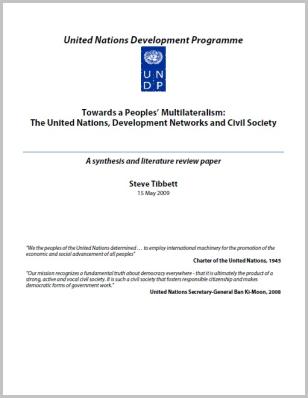Towards a Peoples' Multilateralism: The UN, Development Networks and Civil Society

English
DownloadTowards a Peoples' Multilateralism: The UN, Development Networks and Civil Society
November 3, 2015
Towards a Peoples' Multilateralism: The UN, Development Networks and Civil Society (2009) aims to review and synthesize the main literature, arguments, theories and proposals coming from academia, civil society, politicians and commentators on the “new multilateralism” – a complex, multilayered process where non-state actors have become increasingly important players in global governance.
There is growing consensus that the better participation of these actors, in particular civil society – NGOs, community groups, local action networks, social movements, faith-based groups – “philanthrocapitalists” and new foundations is fundamental to solutions to the key human development challenges of today. How the United Nations interacts with them is integral to the emergence of a more pluralistic, democratic, accountable multilateralism, and its ability to address human development. The moment is timely: during this period of global crisis there is a deep questioning of the role of multilateral institutions as seen from the perspective of a myriad of stakeholders.
The paper goes on to look at key recent trends within civil society thinking and practice, and analyses the historical and emerging relationship between the UN and civil society. Finally, it suggests principles for better engagement between the UN and civil society and funnels recommendations on which UNDP may commission further studies, start discussions or set in train processes that will create a better understanding of how to strengthen space for civil society engagement in global governance and what the role of the United Nations and of UNDP in particular can be in channeling civil society contributions to the vision of a revitalized multilateralism.

 Locations
Locations